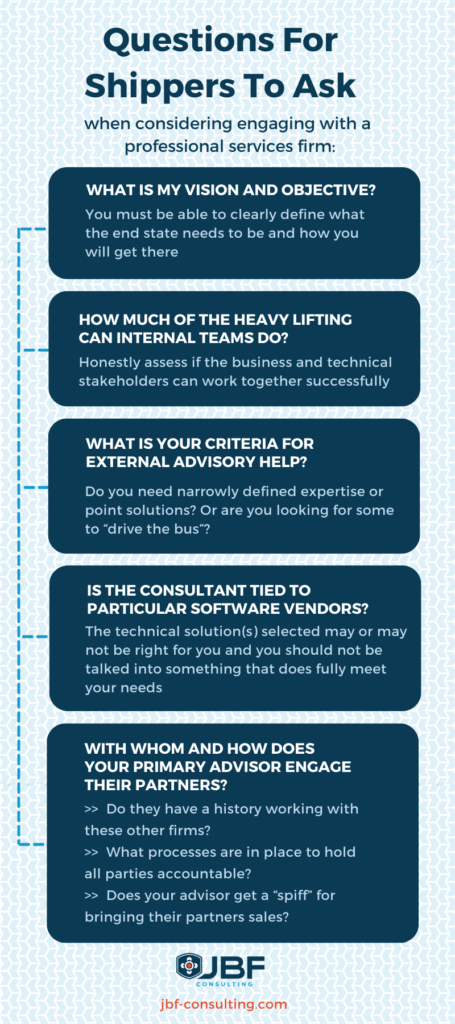
Before a significant shipper recognizes the need for an update or new technology to manage the dynamic logistics of the business, there are many considerations.
Here are some of the tell-tale signs:
- Operations processes are slow, manual, riddled with errors, and costing you time, money, and customer satisfaction.
- IT and business teams lack the bandwidth and horsepower to define requirements, map processes, select a platform or ecosystem of tools, and design-build-implement-test and train users.
- You are in the dark on what post-implementation stewardship of the solution(s) will look like.
If you can relate to one or more of these scenarios, you are not alone.
Transformative Logistics
One way to approach a transformative logistics technology implementation is to think of it as a similar concept to a major home improvement project.
Few shippers, tech vendors, or implementation partners have all the tools and skills to build an addition to your “logistics house”. Domain knowledge, product expertise, process definition, appropriate design and build, project and change management skills.
All are critical to success.
“Few shippers, tech vendors, or implementation partners have all the tools and skills to build an addition to your “logistics house.”
Knowing Your Limitations
Many years ago I bought a house that I knew was going to be the foundational home for my growing family. It was well-built, the previous owner and builder of the property had anticipated expansion, and there was room to grow.
As we envisioned adding more space, we had dreams of what we wanted yet we also had limitations on the budget and the skills to do it all ourselves.
Building non-load-bearing walls, roughing in electrical and plumbing, and hanging drywall was in my wheelhouse. But opening the roof for dormers, sub panel runs, and plumbing fixtures was not.
Obviously the solution was to engage an architect/builder and define who was responsible to deliver what. And many contractors use subs for specific expertise. The “team” delivered an end product that met our expectations from a final product and investment perspective.
"...rarely does a significant project get completed by one person or party. Reliance on, and communication with, various partners drive success."
Considerations for Engagement
Some questions for the shipper who considering engaging with a professional services firm:
- What is my vision and objective?
>> You must be able to clearly define what the end state needs to be and how you will get there - How much of the heavy lifting can internal teams do?
>> Honestly assess if the business and technical stakeholders can work together successfully - What is your criteria for external advisory help?
>> Do you need narrowly defined expertise or point solutions? Or are you looking for some to “drive the bus”? - Is the consultant tied to particular software vendors?
>> The technical solution(s) selected may or may not be right for you and you should not be talked into something that does fully meet your needs - With whom and how does your primary advisor engage their partners?
>> Do they have a history working with these other firms?
>> What processes are in place to hold all parties accountable?
>> Does your advisor get a “spiff” for bringing their partners sales?
"The best for you is a partner that receives no compensation from the selected platform(s). It removes conflict of interest and bias. The goal is always “What is the right solution for the client?'' End of story."
Traits of Successful Engagements
My experience is that partners that exhibit the following traits make for a healthy client/advisor relationship and successful engagements.
- The consultant works for the client, not other firms or tech vendors.
>> Part of that work includes clearly defining the end state and how the team will get there. Everyone signs up to get work done and will be held accountable.
- It is critical that your partner engage your resources at whatever level is appropriate.
>> If you have an internal PMO, then it will look different if you need full governance from your advisor. Either way, an experienced consultant will challenge the readiness and willingness of all stakeholders to be successful. - Some firms are built to be flexible and nimble; some have prescribed engagement rules.
>> Seek the partner that can assume whatever role fits with your culture and needs. Project management, strategic advisory, hands in the guts of an implementation or some combination therein. Ideally, you want a partner that can do as much or as little the client desires. - Gravitate toward a firm that is technology agnostic.
>> The best for you is a partner that receives no compensation from the selected platform(s). It removes conflict of interest and bias. The goal is always “What is the right solution for the client?'' End of story. - Work with someone who is well-connected in the industry and will engage additional partners when necessary.
>> This is irrespective of the size of the firm, it is preferable to Again these are ‘no strings attached’ relationships leveraged to add to the value delivered.
Moral of the Story
Rarely does a significant project get completed by one person or party. Reliance on, and communication with, various partners drive success. True experts know their limitations and engage trusted partners to deliver as part of the team.
RELATED POSTS
First-Time TMS Implementation: Essential Organization Considerations for Transportation Leadership
The Go-Live is Not the End of the Journey – It’s a New Beginning!
The Client Journey Through Supply Chain Evolution
ebooks/white papers
Buyers Guide to Transportation Management Systems (white paper)
Optimizing Transportation's Spend and Impact (white paper)
Case Studies
First Time TMS Implementation for Automotive and Industrial Battery Manufacturer
Dennis Heppner is a Principal at JBF Consulting. Dennis’ expertise in transportation, logistics and supply chain operations, and third-party providers spans 25+ years. His experience is broad-based, spanning entire supply chains, including business process redesign, sourcing, distribution network design, transportation management, distribution operations, outsourcing selection, and business strategy for major manufacturers, distributors, retailers including eCommerce, and service organizations.
About JBF Consulting
Since 2003, we’ve been helping shippers of all sizes and across many industries select, implement and squeeze as much value as possible out of their logistics systems. We speak your language — not consultant-speak – and we get to know you. Our leadership team has over 100+ years of logistics and TMS implementation experience. Because we operate in a niche — we’re not all things to all people — our team members have a very specialized skill set: logistics operations experience + transportation technology + communication and problem-solving skills + a bunch of other cool stuff.



